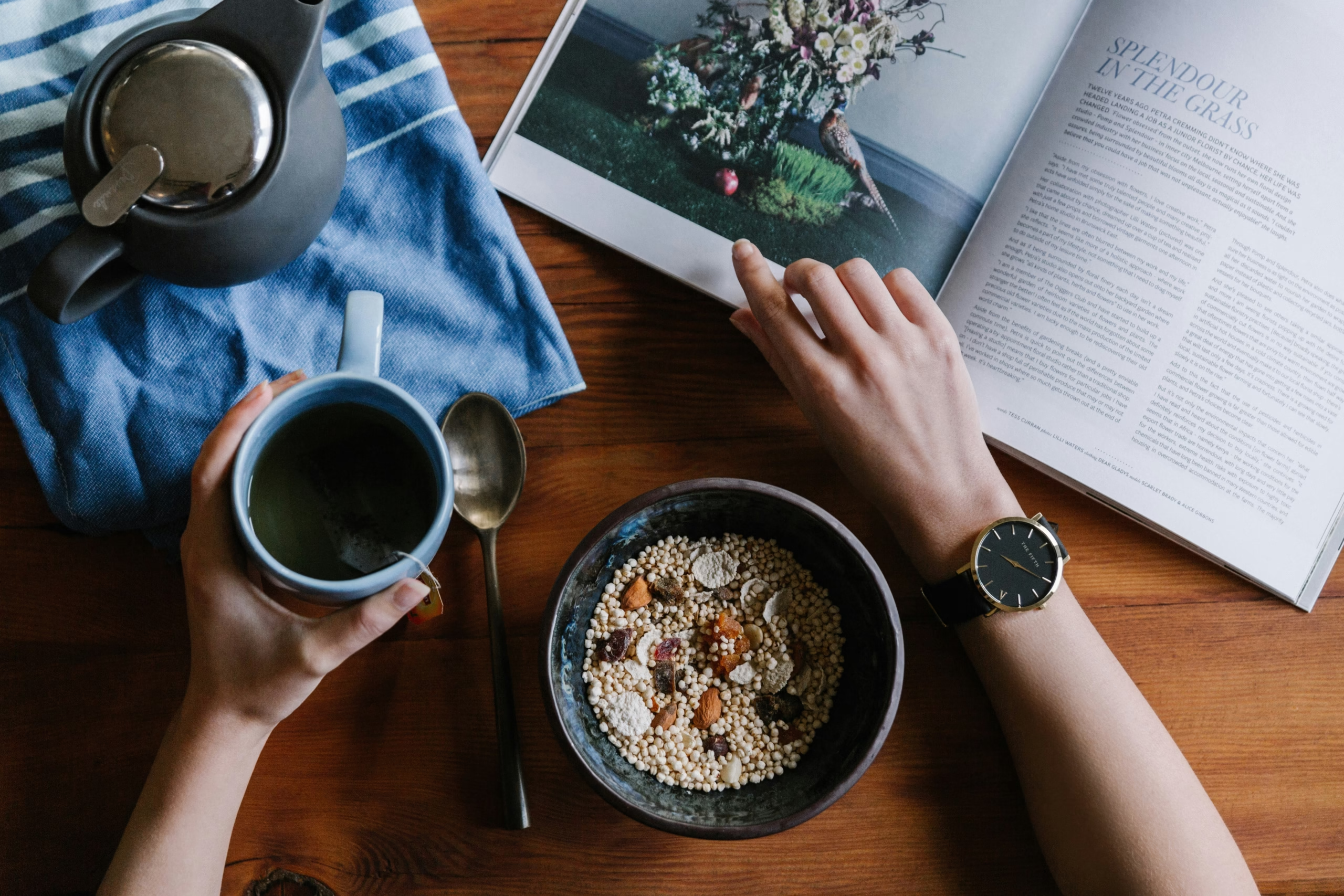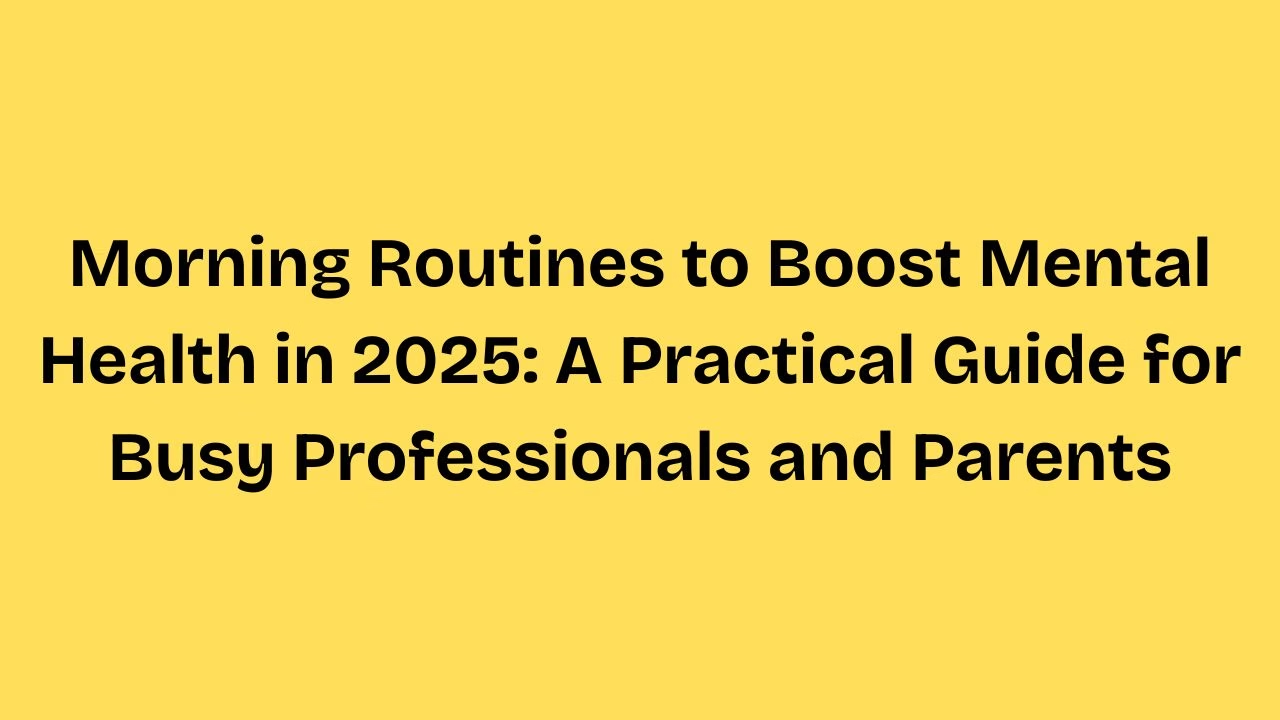In 2025, mental health has taken centre stage in conversations about well-being. With the hustle of modern life—whether you’re a professional juggling deadlines or a parent managing a household—finding balance is more critical than ever. The good news? A thoughtfully crafted morning routine can set the tone for a calmer, more focused, and emotionally resilient day. This isn’t about waking up at 5 a.m. to run a marathon or sipping overpriced green juice. It’s about intentional, science-backed practices that nurture your mind and fit into your busy life.
In this comprehensive guide, we’ll explore why morning routines are a game-changer for mental health, share practical steps to build one, and offer tailored tips for professionals and parents. Whether you’re battling stress, seeking clarity, or simply want to feel more grounded, this article will empower you to create a morning routine that works in 2025’s fast-paced world.
Why Morning Routines Matter for Mental Health
The morning is a unique window of opportunity. It’s when your mind is fresh, your willpower is at its peak, and you can set the trajectory for the rest of the day. Research from the American Psychological Association (APA) shows that consistent morning habits can reduce stress, improve mood, and enhance cognitive function. Here’s why morning routines are especially powerful for mental health:
1. They Create Structure in a Chaotic World
Life in 2025 is unpredictable. From global uncertainties to personal responsibilities, it’s easy to feel overwhelmed. A morning routine acts as an anchor, providing predictability and control. According to a 2023 study published in Frontiers in Psychology, structured routines are linked to lower anxiety levels because they reduce decision fatigue. When you know exactly how your morning will unfold, you free up mental energy for the challenges ahead.
2. They Boost Dopamine and Serotonin
Starting your day with intentional activities—like movement, gratitude, or even a warm cup of tea—can trigger the release of feel-good neurotransmitters like dopamine and serotonin. These chemicals play a key role in regulating mood and combating symptoms of depression, as noted in a 2024 review in Nature Neuroscience. A morning routine isn’t just a to-do list; it’s a mood enhancer.
3. They Set a Positive Tone
Ever notice how a stressful morning—like oversleeping or skipping breakfast—throws off your entire day? The “primacy effect,” a psychological principle, suggests that the first experiences of your day heavily influence your mindset. A mindful morning routine can prime your brain for positivity, resilience, and productivity, making it easier to handle whatever 2025 throws your way.
4. They’re Accessible to Everyone
You don’t need a gym membership, a meditation guru, or hours of free time to build a morning routine. The beauty of morning habits is their flexibility. Whether you’re a corporate executive or a stay-at-home parent, you can tailor a routine to fit your schedule, budget, and lifestyle.

The Science Behind Morning Routines and Mental Health
Before diving into practical steps, let’s ground this in science. Morning routines work because they align with our biology and psychology. Here are a few key mechanisms:
- Cortisol Regulation: Cortisol, the stress hormone, naturally peaks in the morning as part of your body’s circadian rhythm. A 2024 study in The Journal of Endocrinology found that engaging in calming morning activities, like deep breathing or light stretching, can prevent cortisol spikes from becoming excessive, reducing stress throughout the day.
- Neuroplasticity: Your brain is most receptive to forming new habits in the morning, according to research from Neuroscience Letters (2023). By consistently practicing positive behaviors, you strengthen neural pathways associated with calm and focus.
- Sleep-Wake Alignment: Morning routines reinforce a healthy circadian rhythm, which is critical for mental health. A 2025 meta-analysis in Sleep Medicine Reviews linked consistent wake-up times to lower rates of anxiety and depression.
With this foundation, let’s explore how to build a morning routine that supports mental health, with specific tips for professionals and parents.
Step-by-Step Guide to Building Your Morning Routine
Creating a morning routine doesn’t mean overhauling your life. It’s about small, sustainable changes that add up. Below is a step-by-step guide to crafting a routine that prioritizes mental health. Each step includes options to customize for professionals (who often face high-pressure workdays) and parents (who juggle family demands).
Step 1: Wake Up with Intention (5-10 Minutes)
The way you transition from sleep to wakefulness sets the tone for your mental state. Avoid diving straight into emails or social media, which can spike anxiety. Instead, try these practices:
- For Professionals: Practice a “digital detox” for the first 10 minutes of your day. Keep your phone on airplane mode and spend a few moments stretching or sipping water. This helps you ease into the day without the stress of notifications.
- For Parents: Mornings can be chaotic with kids. Try waking up 5-10 minutes before your children to enjoy a quiet moment. Use this time for a quick gratitude practice: jot down one thing you’re thankful for, like a supportive partner or a warm home. This simple act, backed by a 2023 study in Emotion, boosts positivity.
Pro Tip: Set a gentle alarm, like birdsong or chimes, to avoid the jarring effect of a blaring buzzer. A 2024 study in Sleep Health found that softer alarms reduce morning stress.
Step 2: Hydrate and Nourish Your Body (10-15 Minutes)
Your brain is 73% water, and dehydration can impair mood and focus, according to a 2023 study in Nutrients. Start your morning by hydrating and eating a brain-boosting breakfast.
- For Professionals: Sip a glass of water with lemon or a pinch of sea salt to replenish electrolytes. Pair it with a quick breakfast like overnight oats with berries or a smoothie with spinach, banana, and almond butter. These foods are rich in antioxidants and omega-3s, which support cognitive function, per a 2024 review in Nutritional Neuroscience.
- For Parents: Mornings are hectic, so prep breakfast the night before. Try a chia seed pudding (mix chia seeds with almond milk and top with fruit) that you can grab and go. If you’re feeding kids, involve them in simple tasks like spreading peanut butter on toast to foster connection and reduce your workload.
Pro Tip: Avoid sugary cereals or heavy pastries, which can cause energy crashes and mood swings. Opt for whole foods to stabilize blood sugar, as recommended by the American Dietetic Association in 2025.
Step 3: Move Your Body (10-20 Minutes)
Physical activity is a proven mood booster. A 2024 meta-analysis in The Lancet Psychiatry found that just 10 minutes of moderate exercise daily can reduce symptoms of anxiety and depression. You don’t need a gym—here’s how to make movement work for you:
- For Professionals: Try a brisk walk around your neighborhood while listening to an uplifting podcast or instrumental music. If you’re short on time, do a 10-minute yoga flow with poses like cat-cow or downward dog to release tension.
- For Parents: Turn movement into family fun. Have a 10-minute dance party with your kids to a playlist of their favorite songs. Alternatively, do bodyweight exercises (like squats or push-ups) while your kids play nearby. This models healthy habits for them, too.
Pro Tip: Focus on consistency, not intensity. Even a short walk can increase endorphin levels, making you feel more energized and less stressed.
Step 4: Practice Mindfulness (5-10 Minutes)
Mindfulness—paying attention to the present moment—reduces rumination and improves emotional regulation, according to a 2023 study in Mindfulness. You don’t need to meditate for hours to reap the benefits.

- For Professionals: Try a 5-minute guided meditation using a free app like Insight Timer. Focus on your breath or visualize a successful workday. If meditation isn’t your thing, practice “box breathing”: inhale for 4 seconds, hold for 4, exhale for 4, and hold for 4. This technique, used by Navy SEALs, calms the nervous system.
- For Parents: Mindfulness can be tough with kids around, so try “micro-moments” of presence. While brushing your teeth, focus on the sensation of the bristles or the taste of toothpaste. Or, sit with your child for a 2-minute “calm-down” exercise: take slow, deep breaths together.
Pro Tip: If you’re new to mindfulness, start with 1-2 minutes and gradually increase. Consistency matters more than duration.
Step 5: Plan Your Day with Purpose (5-10 Minutes)
A clear plan reduces mental clutter and boosts confidence. Take a few minutes to prioritize tasks and set intentions.
- For Professionals: Use a planner or app like Notion to list your top three priorities for the day. Include one “mental health win,” like taking a 10-minute walk during lunch. This aligns with the “3-2-1 method” popularized by productivity experts in 2025, which emphasizes three big tasks, two small wins, and one self-care goal.
- For Parents: Mornings are unpredictable, so keep it simple. Write down one family task (e.g., packing lunches), one personal task (e.g., responding to an email), and one self-care goal (e.g., drinking a full glass of water). Involve older kids by asking them to name one thing they’re excited about today—it fosters connection and positivity.
Pro Tip: Avoid overloading your to-do list. A 2024 study in Journal of Applied Psychology found that overly ambitious plans increase stress and reduce satisfaction.
Step 6: Connect with Others (5-10 Minutes)
Human connection is vital for mental health. A 2025 report from the World Health Organization emphasized that social bonds reduce loneliness and boost resilience.
- For Professionals: Send a quick text to a friend or colleague to check in. Alternatively, share a coffee break with a partner or roommate to chat about something non-work-related. These small interactions build a sense of belonging.
- For Parents: Use morning routines to connect with your kids. While eating breakfast, ask open-ended questions like, “What’s one fun thing you want to do today?” or share a silly joke. If you’re co-parenting, take a moment to sync with your partner about the day ahead.
Pro Tip: Even brief interactions count. A smile, a hug, or a kind word can release oxytocin, the “bonding hormone,” per a 2023 study in Social Neuroscience.
Tailoring Your Routine to Your Lifestyle
Not every morning routine looks the same. Here are additional tips to customize yours based on your unique needs in 2025:
For Professionals
- Time Constraints: If you’re short on time, combine steps. For example, listen to a mindfulness podcast while walking or plan your day while sipping coffee.
- Work Stress: If you face high-pressure days, add a “pre-work ritual” like journaling one thing you’re proud of from yesterday. This builds self-esteem, per a 2024 study in Self and Identity.
- Hybrid/Remote Work: If you work from home, create a “transition ritual” to signal the start of your workday, like lighting a candle or changing into work clothes. This helps separate personal and professional life.
For Parents
- Young Kids: Involve toddlers in your routine to keep them engaged. For example, stretch together or let them “help” with breakfast prep.
- Teenagers: Encourage teens to build their own morning routines. Model habits like gratitude or movement, and offer gentle guidance without nagging.
- Self-Care Guilt: Parents often prioritize family over themselves. Remember that taking care of your mental health makes you a better caregiver. Even 10 minutes of “you time” can make a difference.
Overcoming Common Obstacles
Building a morning routine isn’t always smooth sailing. Here’s how to tackle common challenges:
- I’m Not a Morning Person: You don’t need to wake up at dawn. Shift your routine to start whenever you naturally wake up, even if it’s 8 a.m. The key is consistency, not timing.
- I Don’t Have Time: Start with just 5 minutes. For example, drink water and take 10 deep breaths. Gradually add more as you build the habit.
- I Keep Falling Off Track: Habits take time to form—about 66 days, according to a 2023 study in Behavioral Science. If you miss a day, don’t give up. Pick one step to focus on the next morning.
- My Kids Disrupt Everything: Embrace imperfection. If your routine gets interrupted, do a “mini reset” later, like a 2-minute mindfulness break during a quiet moment.
Morning Routine Ideas for 2025 Trends
To keep your routine fresh and aligned with 2025’s wellness trends, consider incorporating these ideas:
- Sound Healing: Use a sound bowl or listen to binaural beats for 5 minutes to promote relaxation. This trend, popularized on social platforms, is backed by a 2024 study in Journal of Music Therapy showing reduced stress.
- Postbiotics: Add a postbiotic supplement to your morning smoothie. These gut health boosters are trending in 2025 and may improve mood via the gut-brain axis, per Nutrients (2024).
- Cold Exposure: End your shower with 30 seconds of cold water to boost alertness and resilience. A 2023 study in Frontiers in Physiology linked cold exposure to improved mental clarity.
- Gratitude Jars: Write one thing you’re grateful for on a slip of paper and add it to a jar. This trendy practice fosters positivity and creates a keepsake for the year.
Sample Morning Routines
Here are two sample routines—one for professionals and one for parents—to inspire you. Adjust as needed to fit your life.
For Professionals (30 Minutes)
- 7:00 a.m.: Wake up, stretch for 2 minutes, and drink a glass of water with lemon.
- 7:05 a.m.: Do a 10-minute yoga flow or brisk walk.
- 7:15 a.m.: Eat a brain-boosting breakfast (e.g., avocado toast with eggs).
- 7:25 a.m.: Practice 5 minutes of box breathing or meditation.
- 7:30 a.m.: Review your top three priorities and send a quick text to a friend.
For Parents (20 Minutes)
- 6:30 a.m.: Wake up, jot down one thing you’re grateful for, and drink water.
- 6:35 a.m.: Do a 5-minute dance party with your kids or bodyweight exercises.
- 6:40 a.m.: Eat a quick breakfast (e.g., chia pudding) while chatting with your kids.
- 6:50 a.m.: Take 2 minutes for deep breathing or a mindfulness moment.
- 6:55 a.m.: Plan one family task, one personal task, and one self-care goal.
The Long-Term Benefits
Committing to a morning routine isn’t just about feeling good today—it’s an investment in your future mental health. Over time, you may notice:
- Reduced Anxiety: Consistent routines lower cortisol and increase feelings of control.
- Improved Focus: Morning habits prime your brain for productivity and clarity.
- Stronger Relationships: Connection-focused routines foster bonds with family and friends.
- Greater Resilience: A strong mental foundation helps you navigate life’s challenges with grace.
Conclusion: Start Small, Shine Bright
In 2025, mental health is more than a buzzword—it’s a priority. A morning routine tailored to your life as a professional or parent can be a powerful tool to nurture your mind, reduce stress, and embrace each day with purpose. Start small, experiment with what feels right, and give yourself grace as you build this habit. Whether it’s a 5-minute gratitude practice or a 30-minute wellness ritual, every step you take is a victory.
American Psychological Association (APA) – Stress Management Resources Link: https://www.apa.org/topics/stress
Harvard Health Publishing – The Benefits of Mindfulness Link: https://www.health.harvard.edu/mind-and-mood/mindfulness
So, tomorrow morning, take a deep breath, sip your water, and begin. Your mind deserves it.
For More Articles Visit Website
For more job updates, technology news other articles visit website click here

